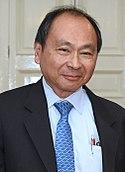Francis Fukuyama Quote
We might label this the Hobbesean fallacy: the idea that human beings were primordially individualistic and that they entered into society at a later stage in their development only as a result of a rational calculation that social cooperation was the best way for them to achieve their individual ends. This premise of primordial individualism underpins the understanding of rights contained in the American Declaration of Independence and thus of the democratic political community that springs from it. This premise also underlies contemporary neoclassical economics, which builds its models on the assumption that human beings are rational beings who want to maximize their individual utility or incomes. But it is in fact individualism and not sociability that developed over the course of human history. That individualism seems today like a solid core of our economic and political behavior is only because we have developed institutions that override our more naturally communal instincts. Aristotle was more correct than these early modern liberal theorists when he said that human beings were political by nature. So while an individualistic understanding of human motivation may help to explain the activities of commodity traders and libertarian activists in present-day America, it is not the most helpful way to understand the early evolution of human politics. Everything
We might label this the Hobbesean fallacy: the idea that human beings were primordially individualistic and that they entered into society at a later stage in their development only as a result of a rational calculation that social cooperation was the best way for them to achieve their individual ends. This premise of primordial individualism underpins the understanding of rights contained in the American Declaration of Independence and thus of the democratic political community that springs from it. This premise also underlies contemporary neoclassical economics, which builds its models on the assumption that human beings are rational beings who want to maximize their individual utility or incomes. But it is in fact individualism and not sociability that developed over the course of human history. That individualism seems today like a solid core of our economic and political behavior is only because we have developed institutions that override our more naturally communal instincts. Aristotle was more correct than these early modern liberal theorists when he said that human beings were political by nature. So while an individualistic understanding of human motivation may help to explain the activities of commodity traders and libertarian activists in present-day America, it is not the most helpful way to understand the early evolution of human politics. Everything
Related Quotes
About Francis Fukuyama
Fukuyama is best known for his book The End of History and the Last Man (1992), which argues that the worldwide spread of liberal democracies and free-market capitalism of the West and its lifestyle may signal the end point of humanity's sociocultural evolution and political struggle and become the final form of human government, an assessment met with numerous and substantial criticisms. In his subsequent book Trust: Social Virtues and Creation of Prosperity (1995), he modified his earlier position to acknowledge that culture cannot be cleanly separated from economics. Fukuyama is also associated with the rise of the neoconservative movement, from which he has since distanced himself.
Fukuyama has been a senior fellow at the Freeman Spogli Institute for International Studies since July 2010 and the Mosbacher Director of the Center on Democracy, Development and the Rule of Law at Stanford University. In August 2019, he was named director of the Ford Dorsey Master's in International Policy at Stanford.
Before that, he served as a professor and director of the International Development program at the School of Advanced International Studies of Johns Hopkins University. Previously, he was Omer L. and Nancy Hirst Professor of Public Policy at the School of Public Policy at George Mason University.
He is a council member of the International Forum for Democratic Studies founded by the National Endowment for Democracy and was a member of the Political Science Department of the RAND Corporation. He is also one of the 25 leading figures on the Information and Democracy Commission launched by Reporters Without Borders. In 2024 he received the Riggs Award for Lifetime Achievement in International and Comparative Public Administration.
